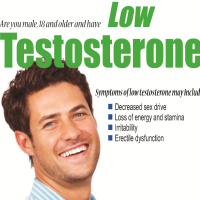Latest Condition Invented by Drug Companies…Low Testosterone
 (graphic: High Point Clinical Trials Center)
(graphic: High Point Clinical Trials Center)
The Big Pharma disease mongers are at it again, barraging middle-age men with deceptive ad campaigns designed to convince them that the natural effects of aging may be symptoms of a fictitious medical condition that can be treated with prescription hormones they just so happen to sell—at a cost of about $400 to $500 per month.
The ads play on men’s fears of aging and loss of virility, implying that several typical aspects of male aging are ominous signs of disease: “Have you noticed a recent deterioration of your ability to play sports?” “Do you have a decrease in sex drive?” “Do you have a lack of energy?”
If so, warns Big Pharma, you should “talk to your doctor about whether you have low testosterone” or “Low T,” the industry’s made-up acronym to make the pitch sound valid. In fact, all men over 50 experience some degree of lower sex drive, loss of muscle mass and reduced energy, all of which have been understood since the beginning of time to be part of the aging process.
But that perspective does not sell Big Pharma’s patented drugs—in this case, prescription testosterone gels that are absorbed through the skin. T-gels generated more than $2 billion in American sales in 2012, and Big Pharma intends for that to more than double by 2017.
But most physicians believe that, except for cases of deficiencies arising from specific medical problems or the effects of chemotherapy, Low-T is a myth made up by marketers.
“There is no such disease” says Dr. Joel Finkelstein, a Harvard Medical School expert on male hormonal changes during aging. “The market for testosterone gels evolved because there is an appetite among men and because there is advertising. The problem is that no one has proved that it works and we don’t know the risks.”
Dr. Eric Topol, a cardiologist and chief academic officer at Scripps Health in San Diego, says the risks include enlarged prostate and coronary artery disease. “When I ask patients why they’re on it, the instant response, is, ‘I have low T.’ I ask, ‘Why would you even get tested for that?’ There isn’t really a normal.”
But drug companies defend their ad campaigns anyway. Morry B. Smulevitz, a communications director at pharmaceutical giant Lilly (2012 revenues: $22.6 billion), insists that testosterone deficiency is “a recognized clinical condition, with signs/symptoms that can impact millions of patients.” Lilly manufactures the testosterone gel, Axiron.
Low-T is far from the first case of disease mongering. In 2012, drug makers in the U.S. spent $3.47 billion on advertising directly to consumers, according to FiercePharma.com, an amount most physicians believe is excessive, according to a recent survey that also found that 63% of doctors said the ads misinform patients. As AllGov reported nearly two years ago, Big Pharma regularly uses the disease monger playbook both by creating fictitious diseases like restless leg syndrome and female sexual dysfunction, and by greatly exaggerating the incidence of real conditions like depression, anxiety, and fibromyalgia.
-Matt Bewig
To Learn More:
A Push to Sell Testosterone Gels Troubles Doctors (by Elisabeth Rosenthal, New York Times)
Drug Companies Increase Profits by Creating Fear of Diseases (and Even Diseases) (by David Wallechinsky, AllGov)
- Top Stories
- Unusual News
- Where is the Money Going?
- Controversies
- U.S. and the World
- Appointments and Resignations
- Latest News
- Trump Orders ICE and Border Patrol to Kill More Protestors
- Trump Renames National Football League National Trump League
- Trump to Stop Deportations If…
- Trump Denounces World Series
- What If China Invaded the United States?






Comments